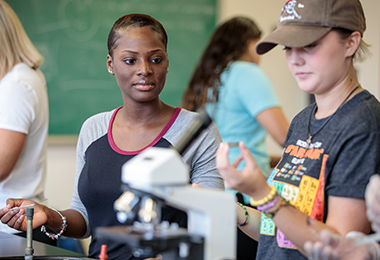Do you love watching television shows such as CSI or NCIS? Do you wish you knew more about the physical properties of blood evidence, blood spatter patterns, toxicology, fingerprint evidence collection and analysis, or criminal investigation? If the answer is ‘yes’, consider earning a minor in forensic science while working on your bachelor’s degree in another field, such as criminal justice, chemistry, biological sciences, or psychology at Valley. Forensic scientists collect, preserve, and analyze evidence during an investigation, either traveling to the crime scene to collect the evidence or analyzing the evidence in a lab. Forensic scientists may also testify as expert witnesses, working for either the prosecution or defense.
Forensic Science
Why a minor in Forensic Science from Missouri Valley?
To become a forensic scientist for the police, you should have a four year undergraduate degree in a field like chemistry, biology or a related natural science like microbiology or biochemistry. This minor is a great way to propel you forward in forensic science, giving you the additional knowledge needed to supplement your chosen major.
Career Possibilities
- Forensic Documents Examiner
- Forensic Science Technician
- Bloodstain Pattern Analyst
- Forensic DNA Analyst
- Forensic Ballistics Expert
- Polygraph Examiner
- Forensic Toxicologist
Graduate Program Possibilities
- Forensic Science

Programs
Minor in Forensic Science
If you decide to minor in forensic science, you will have to complete a total of 19 hours of chemistry and forensic science courses as well as six credit hours from the following courses: PY-350, Forensic Psychology; CJ-300, Criminal Investigation; or CJ-360, Cybercrime.
Admissions & Scholarships
Ready to apply? Get started now by reviewing our admissions process and explore financial aid options.